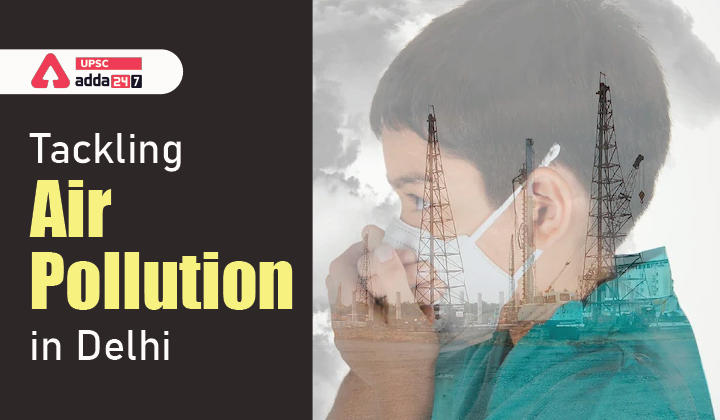Table of Contents
Air pollution UPSC: Relevance
- GS 3: Conservation, environmental pollution and degradation, environmental impact assessment.
Air pollution in Delhi: Context
- Recently, Commission for Air Quality Management in NCR & Adjoining Areas (CAQM) has formulated a Comprehensive Policy to abate the menace of air pollution in Delhi-NCR.
CAQM policy on air pollution: Key points
- The Supreme Court had earlier directed CAQM to find permanent solution to the air pollution menace occurring every year in Delhi and NCR.
- The policy has been formulated towards overall amelioration of the air quality of the National Capital Region (NCR) through differentiated geographical approach and timelines of action.
- This policy contains sector-wise recommendations for the stakeholders including Central Pollution Control Board (CPCB) and State Pollution Control Boards (PCBs) of NCR.
- The primary aim is to prevent, control and abate air pollution in the NCR including industries, vehicles/ transport, construction and demolition (C&D), dust from roads and open areas, municipal solid waste burning, crop residue burning etc.
- The policy framed by CAQM also deals with thermal power plants (TPPs), clean fuels & electric mobility, public transportation, road traffic management, diesel generators (DGs), bursting of fire crackers and abating air pollution through greening and plantation.
Applicability of the policy
- The National Capital Territory (NCT) of Delhi
- The NCR districts near Delhi — Gurugram, Faridabad, Sonipat, Jhajjar, Rohtak, Ghaziabad, Gautam Buddha Nagar and Baghpat
- Other NCR districts
- The entire state of Punjab and the non-NCR districts of Haryana, primarily for addressing episodic events of stubble burning
Key recommendations of NAQM policy
The Expert Group, considering the issues and complexities involved, has suggested short-term (up to one year), medium term (one-three years), and long term (three-five years, preferably) actions.
- Widespread access to affordable clean fuels and technology in industry, transport and households
- Mobility transition including through mass transit, electrification of vehicles, building walking and cycling infrastructure and reducing personal vehicle usage etc
- Circular economy for material recovery from waste to prevent its dumping and burning
- Dust management from C&D activities, roads/Right of Ways (RoW) and open areas with appropriate technology, infrastructure and greening measures
- Strict time-bound implementation, improved monitoring and compliance.
Commission for Air Quality Management
- It was first established though an Ordinance that was promulgated in October, 2021.
- It dissolves the Environment Pollution Prevention and Control Authority established in the NCR in 1998.
Functions
- It will plan and execute such plans to prevent and control air pollution in the NCR.
- It may impose and collect environment compensation—decided by the central government—from farmers causing pollution by stubble burning.
Powers
- It will be the sole authority with jurisdiction over matters defined in the Bill.
- It will issue directions on matters including inspections, or regulation which will be binding on the concerned person or authority.
- t will identify violators, monitor factories and industries and any other polluting unit in the region, and can also shut down such polluting units.
- In case of any conflict, the orders or directions of the Commission will prevail over the orders of the respective state governments, the Central Pollution Control Board (CPCB), state PCBs, and state-level statutory bodies.
Composition
It will consist of:
- a chairperson,
- an officer of the rank of a Joint Secretary as the member-secretary and Chief Coordinating Officer
- a currently serving or former Joint Secretary from the central government as a full-time member
- three independent technical members with expertise related to air pollution, and
- three members from non-government organisations.
It will also include ex-officio members:
- from the central government and concerned state governments, and
- technical members from CPCB (Central Pollution Control Board), Indian Space Research Organisation (ISRO), and NITI Aayog.
- A Selection Committee will be formed to recommend the appointments of the members. The Committee will be headed by the Minister of the Ministry of Environment, Forest and Climate Change.
Read current affairs for UPSC





 TSPSC Group 1 Question Paper 2024, Downl...
TSPSC Group 1 Question Paper 2024, Downl...
 TSPSC Group 1 Answer key 2024 Out, Downl...
TSPSC Group 1 Answer key 2024 Out, Downl...
 UPSC Prelims 2024 Question Paper, Downlo...
UPSC Prelims 2024 Question Paper, Downlo...




